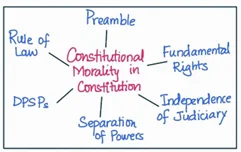Answer:
| Approach:
Introduction
Introduce the concept of Constitutional Morality.
Body
- Mention in brief, in which provisions, it’s present in the constitution.
- Elaborate on the concept with the help of relevant judicial decisions from India, highlighting how Indian courts have shaped the understanding of Constitutional Morality.
Conclusion
- Write a relevant conclusion.
|
Introduction:
Constitutional Morality, though not explicitly stated in the text of the Constitution, is an inherent philosophical concept that governs the operation and interpretation of the Constitution. It embodies the spirit and ethos of the Constitution, ensuring adherence to its core principles, maintaining a balance between individual rights, governmental authority, and the pursuit of social justice.
Body:
Constitutional Morality: presence in the constitution

- The Preamble, often referred to as the soul of the Constitution, encapsulates the essence of Constitutional Morality, outlining the guiding principles of justice, liberty, equality, and fraternity.
- This doctrine is also implicitly embedded in the Fundamental Rights (Articles 14-32) that guarantee equality, freedom, and justice to all citizens, irrespective of their background.
- It is also reflected in the Directive Principles of State Policy (Articles 36-51) and Fundamental Duties (Article 51A), which guide the governance and civic responsibility, respectively.
- Additionally, the principles of Rule of Law, separation of powers, and the independence of the judiciary, all inherently uphold the essence of Constitutional Morality, safeguarding democracy and fostering good governance.
- Thus, Constitutional Morality forms the backbone of the Constitution, serving as a compass for its interpretation and application.
Listed below are the judicial decisions that will help in explaining the doctrine of ‘Constitutional Morality’:
- Kesavananda Bharati v. State of Kerala (1973):
- In this landmark judgment, the Supreme Court of India laid down the ‘basic structure doctrine,’ which holds that the Parliament cannot amend the basic structure of the Constitution.
- The court recognized Constitutional Morality as an essential component of the basic structure, protecting the fundamental values and principles enshrined in the Constitution.
- The basic structure includes fundamental rights (Part III of the Constitution), directive principles of state policy (Part IV), and the principle of separation of powers etc.
- Naz Foundation v. Government of NCT of Delhi (2009):
- The Delhi High Court decriminalized consensual homosexual acts between adults, invoking the principle of Constitutional Morality.
- The court held that criminalizing homosexuality violates the fundamental rights to equality (Article 14), freedom of expression (Article 19), and life and personal liberty (Article 21) enshrined in the Constitution.
- The court emphasized the need for Constitutional Morality to promote inclusiveness, plurality, and tolerance.
- Navtej Singh Johar v. Union of India (2018):
- In this case, the Supreme Court of India struck down Section 377 of the Indian Penal Code, which criminalized consensual homosexual acts.
- The court applied the doctrine of Constitutional Morality, emphasizing the need to protect the rights of LGBTQ+ individuals and to prevent discrimination based on sexual orientation.
- The court referred to Articles 14, 19, and 21 of the Constitution to emphasize the importance of Constitutional Morality in protecting individual rights.
- Government of NCT of Delhi v. Union of India (2018):
- This case dealt with the distribution of powers between the Delhi government and the Union of India.
- The Supreme Court highlighted the importance of Constitutional Morality in federalism, stating that both the central and state governments should abide by the constitutional values and principles to ensure harmony and good governance.
- The court cited Articles 239AA and 239AB, which deal with the special provisions concerning Delhi’s governance, to illustrate the significance of Constitutional Morality in the federal structure.
Conclusion:
These cases highlight the significance of Constitutional Morality in the Indian judiciary, emphasizing the need to adhere to the constitution’s core principles and values. The doctrine of Constitutional Morality acts as a guiding force in ensuring good governance, promoting social justice, and protecting individual rights.
